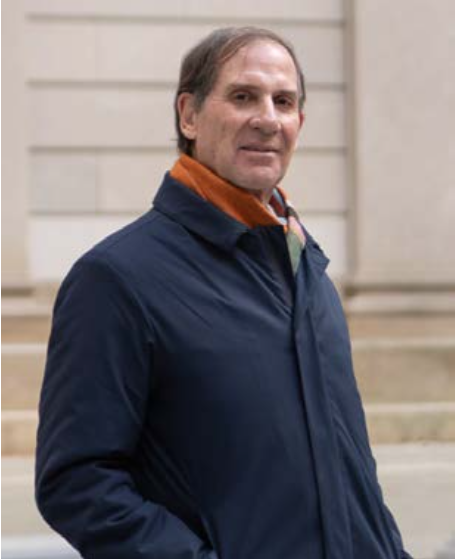![]()
~~~~~~~~~~~~~~~~~~~~~~~~~~~~~~~~~~~
Director Ian Wardropper to Retire in 2025
Tenure Marked by Strategic Institutional Growth as well as
Visionary Renovation and Enhancement of Historic Buildings
———————————————–
 New York, NY (January 3, 2024)—The Frick Collection announced today that Ian Wardropper, the institution’s Anna-Maria and Stephen Kellen Director, will retire in 2025 following fourteen years of service to the Frick and a fifty-year museum career. During his tenure as the Frick’s director, Wardropper led the museum and library through a period of strategic and measured growth, which included the first comprehensive renovation and upgrade of the Frick’s historic buildings in nearly ninety years and a focused acquisitions program that has enhanced the institution’s art and library collections. He also prioritized accessibility and public outreach, spearheading innovative strategies and partnerships that enabled audiences to experience the museum and library in new ways. This has ranged from inventive online programs including Cocktails with a Curator to partnerships with the Ghetto Film School to the conceptualization and management of Frick Madison, which enabled the Frick’s collections and programs to be enjoyed throughout the institution’s renovation and enhancement project.
New York, NY (January 3, 2024)—The Frick Collection announced today that Ian Wardropper, the institution’s Anna-Maria and Stephen Kellen Director, will retire in 2025 following fourteen years of service to the Frick and a fifty-year museum career. During his tenure as the Frick’s director, Wardropper led the museum and library through a period of strategic and measured growth, which included the first comprehensive renovation and upgrade of the Frick’s historic buildings in nearly ninety years and a focused acquisitions program that has enhanced the institution’s art and library collections. He also prioritized accessibility and public outreach, spearheading innovative strategies and partnerships that enabled audiences to experience the museum and library in new ways. This has ranged from inventive online programs including Cocktails with a Curator to partnerships with the Ghetto Film School to the conceptualization and management of Frick Madison, which enabled the Frick’s collections and programs to be enjoyed throughout the institution’s renovation and enhancement project.
The Board of Trustees is working with an executive search firm to conduct an international search for the Frick’s next director. Wardropper will be honored for his innumerable contributions to the museum and the arts community at large at the institution’s fall 2024 gala, which precedes the public reopening of the museum and library in late 2024.
—————————————–
Comments Wardropper, “These fourteen years at the Frick will have been among the most rewarding of my career. From the first strategic plan developed together with the Frick’s dedicated Trustees and talented staff, we identified our aspirations and priorities and committed to the values and programs that make the Frick unique. It has been a great privilege to realize these initiatives during my tenure, the reopening of our upgraded buildings being a highlight among many. Following my retirement from the Frick, I look forward to working on a number of scholarly and academic projects.”
—————————————–
Adds Elizabeth M. Eveillard, Chair of the Frick’s Board of Trustees, “Ian has led the institution through one of the most transformative and dynamic periods in its history, ensuring that the Frick’s core characteristics of intimacy and excellence are maintained. His vision for the Frick’s future addresses the needs of a twenty-first-century museum and library and its audiences, while safeguarding our collections and historic buildings for current and future generations. On behalf of the entire Board of Trustees and staff, I would like to thank Ian for his expert guidance and vision. We look forward to returning to our newly renovated and enhanced home on East 70th Street at the end of this year for a joyous celebration of Ian’s invaluable contributions and the Frick’s promising next century.”
—————————————–
Since joining the Frick as its director in 2011, Wardropper has championed landmark initiatives supporting the Frick’s mission, collection, and programming. Together with the Board of Trustees and Frick leadership, Wardropper conceived and shepherded a strategic and comprehensive plan to upgrade and enhance the Frick’s historic buildings. Designed by Selldorf Architects, the new building project advances institutional goals to open more of the former Frick family residence to the public and showcase more of the permanent collection, while also making critical improvements to the visitor experience and accessibility, infrastructure, and back-of-house operations, such as conservation. Wardropper kept the institution open and thriving during the renovation period by temporarily relocating the collection, staff, and museum and library programs to the Whitney’s Breuer building on Madison Avenue. Working closely with the curatorial team, he orchestrated the acclaimed presentation of the collection and programming at Frick Madison, which provided an unprecedented new context for the museum’s holdings, from the iconic panel of St. Francis in the Desert by Giovanni Bellini in a chapel-like space to the deconstructed, naturally lit Progress of Love series by Jean-Honoré Fragonard.
Throughout his tenure, Wardropper successfully led key fundraising initiatives, embracing exhibitions, programs, and capital upgrades. Currently, he is overseeing a $290-million capital campaign in support of the Frick’s renovation and residency at Frick Madison and has raised $242 million to date—nearly 83% of its goal. Wardropper also worked to thoughtfully grow the Board of Trustees, which has expanded from eighteen to twenty-four seats during his tenure. In recent years, the Frick has also increased its Membership program, with many categories currently at their highest levels to date, more remarkable considering the challenges of the pandemic and the closure and move to Frick Madison.
During his years leading the Frick, Wardropper has overseen significant acquisitions of individual objects and prestigious collections that deepen the museum’s already rich holdings.These include important paintings by Murillo, Moroni, and Gerard; a rare Saint-Porchaire ceramic ewer; and a pair of candelabra by Pierre Gouthière. Among the collections that have come to the institution under this leadership are a promised gift of drawings from Elizabeth and Jean-Marie Eveillard; enamels, clocks, pastels, and other precious decorative arts objects bequeathed by Alexis Gregory; early Meissen from the late Henry Arnhold; DuPaquier porcelain from Melinda and Paul Sullivan; French Faience from Sidney Knafel and Londa Weisman; and the world’s finest private collection of commemorative portrait medals from Stephen and Janie Woo Scher.
Ambitious programmatic initiatives under Wardropper have helped shed new light and furthered important scholarship on the Frick’s own collection, placing these masterworks in a broader context through exhibitions such as Piero della Francesa in America (2013), Van Dyck: The Anatomy of Portraiture (2016), and Turner’s Modern and Ancient Ports: Passages Through Time (2017). Collaborations with major European institutions brought remarkable loans to New York, among them 2013’s Vermeer, Rembrandt, and Hals: Masterpieces of Dutch Painting from the Mauritshuis. A hallmark of the program under Wardropper has been a focus on less published masters in the decorative arts field. Examples are Gold, Jasper, and Carnelian, Johan Christian Neuber at the Saxon Court (2012), which he co-curated; Pierre Gouthière: Virtuoso Gilder at the French Court (2016); Luigi Valadier: Splendor in Eighteenth-Century Rome (2018), which Apollo Magazine named its International Exhibition of the Year. Complementing its exhibitions, the Frick’s publications program has produced more than eighty new titles since 2011, from catalogues praised for their quality and depth of scholarship to vibrant volumes that focus on objects from the permanent collection.
Under Wardropper’s leadership, the institution has sought to forefront the ways in which The Frick Collection has inspired generations of creative individuals, from writers, filmmakers, photographers, painters, sculptors, and musicians to dancers. Public programs have regularly presented talks by artists such as Sally Mann, Ed Ruscha, and Jeff Koons, while publications in the Diptych Series have featured contributions by Alan Hollinghurst, James Ivory, Nico Muhly, William Kentridge, and Elizabeth Peyton, among others. Programs have also included interventions at the mansion by Rob and Nick Carter, Edmund de Waal, and Arlene Shechet, continuing with installations and exhibitions at Frick Madison featuring partnerships with Olafur Eliasson, Jenna Gribbon, Doron Langberg, Toyin Ojih Odutola, Nicolas Party, and Salman Toor. Through January 7, Frick Madison is featuring an acclaimed exhibition of early portraiture by Barkley L. Hendricks, whose artistic practice was deeply influenced by his regular visits to The Frick Collection.
Wardropper’s embrace of technology marks another hallmark of his tenure. He initiated streaming of the Frick’s lecture series within a month of his arrival at in 2011. As such, digital programming was thriving at the institution nearly a decade before many other museums committed to it during the pandemic. The Frick’s response to the shut down in early 2020 was to launch the Webby-nominated weekly video series Cocktails with a Curator, which was viewed by more than 1.7 million people internationally. Through his guidance, the institution became one of the first American institutions to join the Bloomberg Connects App platform. The Frick Art Reference Library has committed to a range of digital initiatives, making its collections freely available online and fostering related partnerships with sister institutions around the world. Among the library’s efforts is the PHAROS Art Research Consortium, a Frick-led initiative that will place its photoarchives, now digitized, on a platform that provides public access to 25 million images of artworks worldwide.
The Frick’s education offerings have expanded to reach new audiences through varying program types. Free and regularly scheduled community events were introduced under Wardropper’s leadership in 2016, and the institution’s ongoing efforts to develop and deepen partnerships with educators and students have grown significantly as well. Notable among these is the Ghetto Film School collaboration, now in its eighth year. In addition, educational programming has been a priority in planning for the improved facilities at the Frick mansion. The newly configured spaces will include the institution’s first dedicated classroom and orientation hall.
Wardropper has also overseen an expansion of discounted and free admission programs at the Frick during his directorship. Free youth admission for visitors aged ten to seventeen was instituted earlier in 2023, and other changes include expanded discounts to visitors with disabilities, as well as to students enrolled in educational institutions across New York City. The Frick also participates in the national program Museums for All. Unusual for museums of its size, it has been a champion of employment programs for people with disabilities. With Wardropper’s support, the Frick’s efforts resulted in JobPath NYC naming the institution as 2017’s Employer of the Year. In 2022, New York City presented the Frick with the Sapolin Accessibility Award for Employment, a distinction that recognizes private and public organizations for efforts to enhance inclusion in the workplace of people with disabilities.
Prior to joining the Frick, Wardropper worked for ten years at The Metropolitan Museum of Art, culminating his tenure there as the Iris and B. Gerald Cantor Chairman of the Department of European Sculpture and Decorative Arts. In addition to helping increase the Met’s 60,000-work holdings of European art, Wardropper directed a major reinstallation of the Wrightsman Galleries of French Decorative Arts, a partial redesign of the Annie Laurie Aitken Galleries of English Decorative Arts, a reinstallation of the Carroll and Milton Petrie Court, and a new presentation of the Italian Renaissance Bronzes Gallery. For twenty years prior to that, he was a member of the Art Institute of Chicago’s curatorial team, serving as the Eloise W. Martin Curator of European Decorative Arts, Sculpture, and Ancient Art. Wardropper sits on the boards of NYU’s Institute of Fine Arts and The Isamu Noguchi Foundation and Garden Museum in Long Island City. In 2013, he was named a Chevalier de l’Ordre des Arts et Lettres by the French Minister of Culture and in 1992 was honored with the Austrian Order of the Knight’s Cross. He holds a Ph.D. in art history from New York University.
~~~~~~~~~~~~~~~~~~~~~~~~~~~~~~~~~~~
![]()
Housed in one of New York City’s last great Gilded Age mansions, The Frick Collection has, for nearly ninety years, provided visitors with an unparalleled opportunity for intimate encounters with one of the world’s foremost collections of fine and decorative arts. The basis of the collection was formed by Henry Clay Frick (1849–1919), who bequeathed his Fifth Avenue residence and collection of European paintings, sculpture, and decorative arts for the enjoyment of the public. The institution’s holdings, which encompass masterworks from the Renaissance through the early twentieth century, have grown over the decades, doubling in size since the museum’s opening in 1935.
Adjacent to the museum is the Frick Art Reference Library, founded more than one hundred years ago by Henry Clay Frick’s daughter Helen Clay Frick and recognized as one of the top art history research libraries in the world.
The Frick currently is undergoing a comprehensive renovation and upgrade of its historic buildings, which is slated to be complete at the end of 2024. During this time, the museum and library have continued operations at Frick Madison, which will remain open to the public through March 3, 2024. For more information, please visit frick.org.
Image: Ian Wardropper, Anna-Maria and Stephen Kellen Director of The Frick Collection, at the institution’s historic buildings, which are currently under renovation; photo: Richard Renaldi
~~~~~~~~~~~~~~~~~~~~~~~~~~~~~~~~~~~~~~~~~~
Also, View AAQ Museum Architecture Portfolio:
The Frick Collection: Expansion & Enhancement / Selldorf Architects / Groundbreaking 2020
——————————
=====================================================

AAQ / Resource: Ben Krupinski Builder
_________________________________________________
